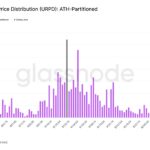The recent imposition of new tariffs by the United States has stirred significant movement within the cryptocurrency sector, particularly affecting Bitcoin mining operations. As companies scramble to adjust to these economic changes, many are racing to relocate their Bitcoin mining equipment from Asia to the U.S. This shift comes amid a backdrop of increasing costs due to tariffs, which have prompted firms like Bitdeer to pivot towards self-mining operations on American soil.
Amid the tariff turmoil, the landscape of Bitcoin mining is evolving. Reports indicate that major Bitcoin mining stocks, which faced a drop earlier in the week due to tariff concerns, have recovered and closed higher, reflecting the resilience of the industry even in challenging times. However, Bitcoin miners can’t ignore the pressing issues of declining hash prices and network security risks that are complicating the mining ecosystem further.
“The changing dynamics in global trade due to tariffs are reshaping operational strategies for Bitcoin miners,” says an industry analyst, highlighting the urgency of adapting to the current market conditions.
The tariffs not only impact equipment logistics but also raise questions about the broader economic effects, such as potential depreciation of the US dollar. As millionaires and savvy investors assess their financial strategies, the conversation about the implications of these tariffs on the cryptocurrency market continues to intensify.
In this rapidly changing landscape, it’s clear that the intersection of traditional trade policy and innovative technology like Bitcoin mining is producing a fascinating narrative that industry watchers will want to follow closely.

Impact of US Tariffs on Bitcoin Mining
The recent developments in US tariffs have had a significant impact on the Bitcoin mining industry. Here are the key points to consider:
- Tariffs Driving Equipment Relocation: Companies are rushing to transfer Bitcoin mining equipment out of Asia to avoid tariffs imposed by the US government.
- Shift to Self-Mining: Companies like Bitdeer are moving towards self-mining operations in the US as a strategy to mitigate tariff risks.
- Market Reactions: Despite initial declines due to tariff concerns, top Bitcoin mining stocks have shown resilience, recovering after the tariff-driven dip.
- Hashprice Decline and Security Risks: The Bitcoin mining sector faces challenges from declining hashprice and increasing network security risks amidst the effects of the trade war.
- Economic Implications: There are questions about whether the tariffs could lead to a depreciation of the US dollar, which could further impact the crypto market and investors’ strategies.
Understanding these shifts is crucial for investors and participants in the Bitcoin mining sector, as it may influence both the market dynamics and their financial decisions in the coming months.
These developments can impact readers by influencing their investment strategies, potentially reshaping the cryptocurrency landscape, and altering the economic environment in which they operate.
US Tariffs and the Bitcoin Mining Landscape: A Game of Strategic Resilience
The recent surge of US tariffs has sent ripples throughout the Bitcoin mining industry, prompting operators to react rapidly to safeguard their equipment and interests. This upheaval has ushered in unique responses from various mining entities, portraying a landscape ripe with competitive advantages for some, while casting shadows of uncertainty over others. For instance, companies like Bitdeer have pivoted to self-mining operations within the US, positioning themselves favorably to mitigate the impacts of these tariffs. The integration of domestic operations not only allows them to avoid the heavy costs associated with importing equipment but also strengthens their foothold in a burgeoning market.
On the flip side, this rush has raised concerns within the mining community. The competitive edge enjoyed by US-based operations may come at a cost of increased tariffs for international competitors. News sources like Cointelegraph and Bloomberg highlight that the tariff-induced disruption could lead to a concentrated market where US firms flourish while overseas miners grapple with shrinking profit margins. This uneven playing field creates an environment where large-scale investors might favor mining stocks that demonstrate resilience during economic turbulence, further driving the performance of firms less affected by external trade policies.
However, while some companies adapt successfully, others face daunting challenges. For example, as reported by Decrypt, the declining hashprice and increasing network security risks, compounded by the uncertainties generated from Trump’s trade policies, could deter new entrants into the market. Established firms might benefit from reduced competition but may also become complacent, neglecting innovation and long-term sustainability.
Additionally, savvy investors who keep a close watch on these developments could find lucrative opportunities in the evolving landscape. Yet, this transition may present hurdles for smaller miners or those lacking sufficient capital to pivot alongside industry shifts. Moreover, the speculation surrounding the depreciation of the US dollar in the context of these tariffs, as mentioned by Bitcoinist.com, could introduce volatility that complicates financial forecasting for the sector.
Therefore, as the dust settles on this turbulent period, the Bitcoin mining industry finds itself at a crossroads, where strategic maneuvers could either pave the way for growth or usher in new obstacles. As stakeholders navigate this climate marked by economic tension and shifts in policy, understanding the implications of tariffs becomes paramount for anyone involved in Bitcoin mining or cryptocurrency investment.

















